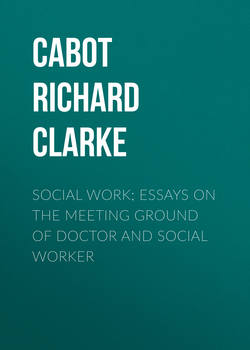Social Work; Essays on the Meeting Ground of Doctor and Social Worker

Реклама. ООО «ЛитРес», ИНН: 7719571260.
Оглавление
Cabot Richard Clarke. Social Work; Essays on the Meeting Ground of Doctor and Social Worker
PREFACE
INTRODUCTION. HISTORICAL DEVELOPMENT OF SOCIAL ASSISTANCE IN MEDICAL WORK
PART I. Medical-Social Diagnosis
CHAPTER I. THE MEDICAL STANDING, DUTIES, AND EQUIPMENT OF THE SOCIAL ASSISTANT
CHAPTER II. HISTORY-TAKING BY THE SOCIAL ASSISTANT
CHAPTER III. ECONOMIC INVESTIGATION BY THE SOCIAL ASSISTANT
CHAPTER IV. MENTAL INVESTIGATION BY THE SOCIAL ASSISTANT
CHAPTER V. MENTAL INVESTIGATION BY THE SOCIAL ASSISTANT (continued)
CHAPTER VI. THE SOCIAL WORKERS' INVESTIGATION OF FATIGUE, REST, AND INDUSTRIAL DISEASE
CHAPTER VII. THE SOCIAL WORKER'S BEST ALLY – NATURE'S CURE OF DISEASE
PART II. Social Treatment
CHAPTER VIII. SAMPLES OF SOCIAL THERAPEUTICS
CHAPTER IX. THE MOTIVE OF SOCIAL WORK
Отрывок из книги
The profession of the social worker, which is the subject of this book, has developed in the United States mostly within the past twenty-five years. Probably ten thousand persons are now so employed. It is known by various titles – social worker, school nurse, home and school visitor, welfare worker, hospital social worker, probation officer – varying according to the particular institution – the hospital, the court, the factory, the school – from which it has developed. But although the use of these visitors has been developed independently by each institution, and largely without consciousness of what was going on in the others, yet the same fundamental motive power has been at work in each case. Because this is so, we shall do well, at the outset of our study of home visiting, to get a clear conception of the common trunk out of which various types of home visitor have come like branches.
Why has such an army of new assistants been called into existence? For this reason: In the school, in the court, in the hospital, in the factory, it has become more and more clear, in the last quarter of a century, that we are dealing with people in masses so great that the individual is lost sight of. The individual becomes reduced to a type, a case, a specimen of a class. These group features, this type of character, of course the individual possesses. He must be paid as "a hand," he must be enrolled in a school as "a pupil," admitted to the dispensary as "a patient," summoned before the court as "a prisoner." But in this necessary process of grouping there is always danger of dehumanization. There is always danger that the individual traits, which admittedly must be appreciated if we are to treat the individual according to his deserts, or to get the most out of him, will be lost sight of. We shall fail to make the necessary distinction between A and B.
.....
At this period, in 1893 and 1894, I had been working for some years as a dispensary physician, concerning myself chiefly with perfecting the methods of diagnosis in a dispensary, so that the patient could obtain there a diagnosis as correct and scientifically founded as he could obtain from a private physician. But in the course of these efforts for a complete and exact diagnosis which should do justice to the actual needs of the patient, I found myself blocked. I needed information about the patient which I could not secure from him as I saw him in the dispensary – information about his home, about his lodgings, his work, his family, his worries, his nutrition. I had no time – no dispensary physician had time – for searching out this information through visiting the patient's home. Yet there was no one else to do it. My diagnoses, therefore, remained slipshod and superficial – unsatisfactory in many cases. Both in these cases and in the others where no diagnosis was possible from the physical examination alone, I found myself constantly baffled and discouraged when it came to treatment. Treatment in more than half of the cases that I studied during these years of dispensary work involved an understanding of the patient's economic situation and economic means, but still more of his mentality, his character, his previous mental and industrial history, all that had brought him to his present condition, in which sickness, fear, worry, and poverty were found inextricably mingled. Much of the treatment which I prescribed was obviously out of the patient's reach. I would tell a man that he needed a vacation, or a woman that she should send her children to the country, but it was quite obvious, if I stopped to reflect a moment, that they could not possibly carry out my prescription, yet no other filled the need. To give medicine was often as irrational as it would be to give medicine to a tired horse dragging uphill a weight too great for him. What was needed was to unload the wagon or rest the horse; or, in human terms, to contrive methods for helping the individual to bear his own burdens in case they could not be lightened. Detailed individual study of the person, his history, circumstances, and character were frequently essential if one was to cure him of a headache, a stomach-ache, a back-ache, a cough, or any other apparently trivial ailment.
Facing my own failures day after day, seeing my diagnoses useless, not worth the time that I had spent in making them because I could not get the necessary treatment carried out, my work came to seem almost intolerable. I could not any longer face the patients when I had so little to give them. I felt like an impostor.
.....